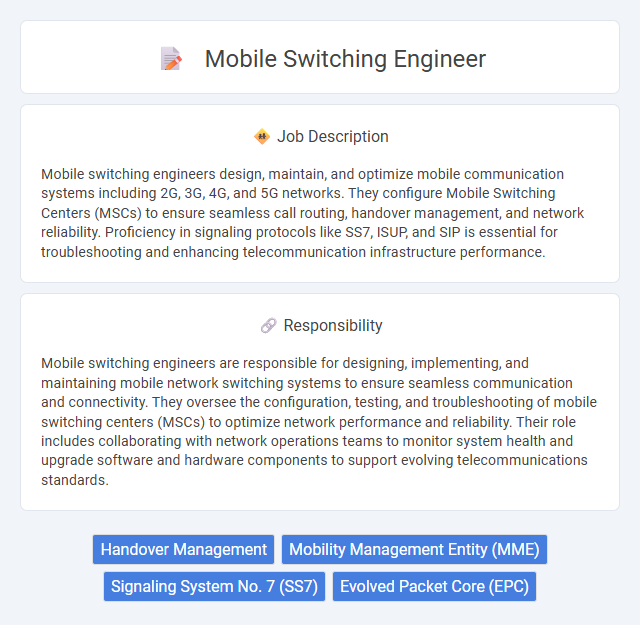
Mobile switching engineers design, maintain, and optimize mobile communication systems including 2G, 3G, 4G, and 5G networks. They configure Mobile Switching Centers (MSCs) to ensure seamless call routing, handover management, and network reliability. Proficiency in signaling protocols like SS7, ISUP, and SIP is essential for troubleshooting and enhancing telecommunication infrastructure performance.
Individuals with strong analytical skills and an interest in telecommunications technology are likely to fit well in a Mobile Switching Engineer role. Those comfortable working in fast-paced environments and troubleshooting complex network issues may find increased job satisfaction. However, people who prefer less technical or more socially interactive roles might struggle with the demands of this position.
Qualification
Mobile switching engineer roles require a strong foundation in telecommunications engineering, including expertise in GSM, LTE, and 5G technologies. Proficiency in configuring and troubleshooting Mobile Switching Centers (MSCs) and knowledge of protocols such as SIGTRAN and SS7 are essential. Candidates typically hold a bachelor's degree in electronics, telecommunications, or computer engineering, along with certifications in network management and telecommunications systems.
Responsibility
Mobile switching engineers are responsible for designing, implementing, and maintaining mobile network switching systems to ensure seamless communication and connectivity. They oversee the configuration, testing, and troubleshooting of mobile switching centers (MSCs) to optimize network performance and reliability. Their role includes collaborating with network operations teams to monitor system health and upgrade software and hardware components to support evolving telecommunications standards.
Benefit
A Mobile Switching Engineer likely benefits from strong job stability due to the ongoing demand for mobile communication networks. They probably enjoy opportunities for professional growth as technology advances in telecommunications. Competitive salaries and exposure to cutting-edge network infrastructure may also be significant advantages in this role.
Challenge
Mobile switching engineer roles likely involve complex problem-solving due to the need to ensure seamless network connectivity and manage high traffic loads. Troubleshooting network failures and optimizing system performance may present ongoing technical challenges. The job probably requires staying updated with evolving telecommunications technologies to effectively address emerging issues.
Career Advancement
Mobile switching engineers play a critical role in designing, implementing, and maintaining network switching equipment essential for cellular communication. Career advancement opportunities often include progressing to senior network engineer roles, specializing in 5G technologies, or moving into network architecture and project management positions. Gaining certifications such as Cisco Certified Network Professional (CCNP) and experience with LTE and 5G core networks significantly enhance promotion prospects and salary growth.
Key Terms
Handover Management
Mobile switching engineers specialize in designing, optimizing, and maintaining seamless handover management systems within cellular networks to ensure uninterrupted call continuity during user mobility. They implement and troubleshoot handover protocols such as hard handover, soft handover, and inter-frequency handover across various technologies like GSM, UMTS, and LTE. Proficiency in signaling protocols, radio resource management, and network performance analysis is essential for effective handover optimization and minimizing call drops.
Mobility Management Entity (MME)
A Mobile Switching Engineer specializing in Mobility Management Entity (MME) oversees the control plane functions within LTE core networks, ensuring efficient signaling and session management for user equipment. Expertise in MME configuration and optimization directly impacts handover performance, subscriber authentication, and idle mode tracking. Proficiency with Diameter protocol, S1-MME interface, and integration with Serving Gateway (S-GW) enhances network reliability and seamless mobility.
Signaling System No. 7 (SS7)
Mobile switching engineers specializing in Signaling System No. 7 (SS7) play a critical role in managing and optimizing telecommunications networks by ensuring efficient call setup, routing, and teardown. Expertise in SS7 protocols, including ISUP, SCCP, and TCAP, enables seamless integration and interoperability between mobile switching centers (MSCs) and other network elements. Proficiency in diagnosing SS7 network issues, configuring signaling links, and maintaining signaling points directly enhances network reliability and performance in mobile communication systems.
Evolved Packet Core (EPC)
A Mobile Switching Engineer specializing in Evolved Packet Core (EPC) is responsible for designing, implementing, and maintaining the core network infrastructure that supports LTE and 4G connectivity. Expertise in EPC components such as MME (Mobility Management Entity), SGW (Serving Gateway), and PGW (Packet Data Network Gateway) is crucial for optimizing network performance and ensuring seamless data routing and mobility management. Proficiency in signaling protocols like S1-AP and GTP, as well as troubleshooting and capacity planning, is essential for maintaining high service quality in mobile telecommunications networks.
 kuljobs.com
kuljobs.com